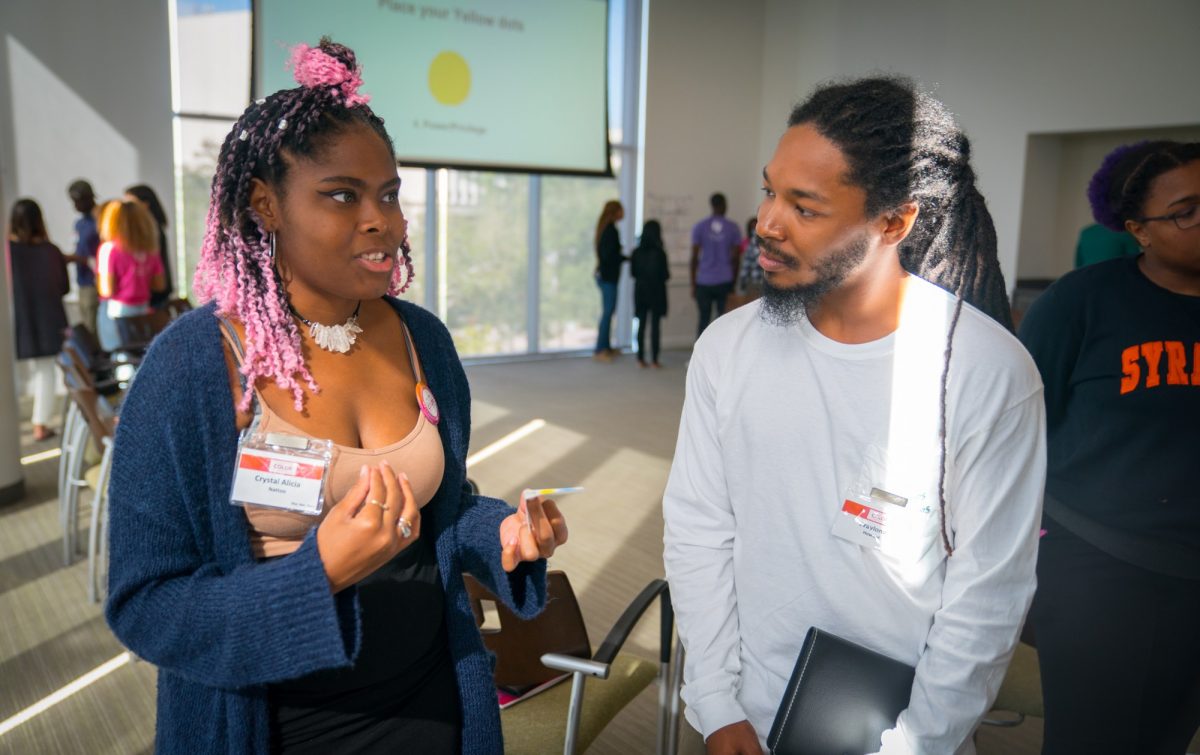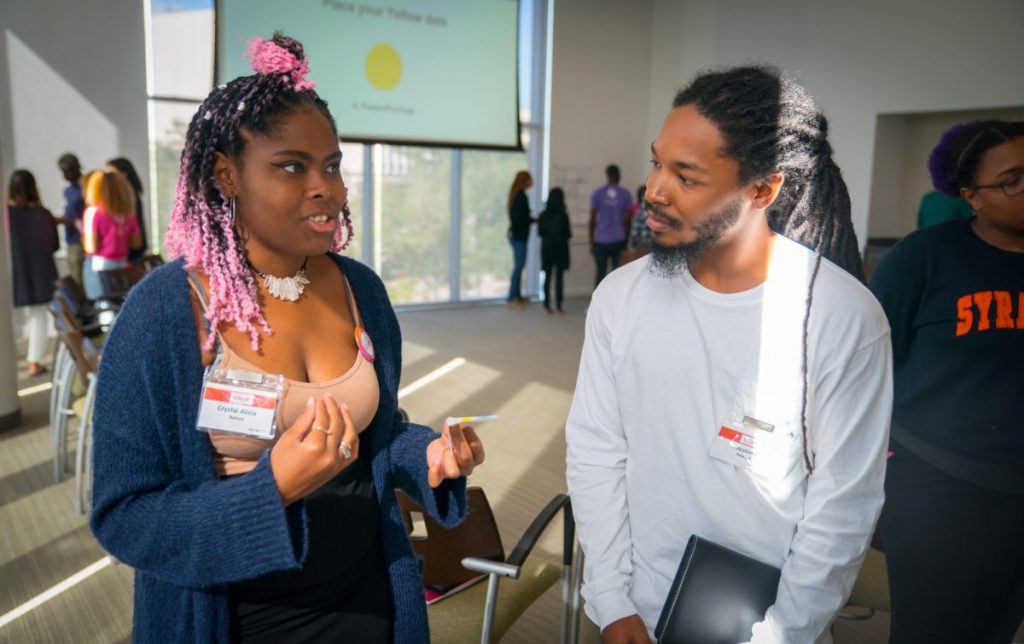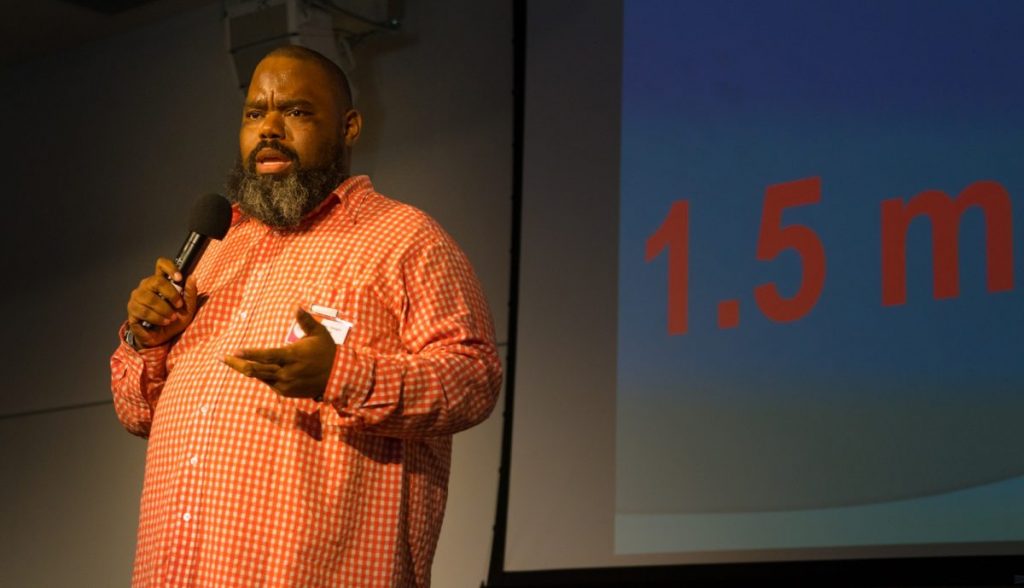

As a black woman, senior Lily Acheampomaa-Piasare said she goes through many experiences on a day-to-day basis that other students do not have to endure. The Students of Color Symposium gave her, along with other minority students, the space to share her point of view with students of all backgrounds, many of which had faced similar forms of prejudice and exclusion.
Acheampomaa-Piasare was one of more than 130 students to attend the symposium, hosted on Jan. 27 in the Shalala Student Center Ballrooms. The two-day event was created to provide a space for students from different backgrounds to congregate, speak about issues they face and attend workshops about various hot-button topics, such as toxic masculinity, representation in film and handling microaggressions versus macroaggressions.
Microaggression is a catchall term for the common, everyday slights that either intentionally or unintentionally convey derogatory messages. More severe, outright, intentional displays of racism or other discrimination are termed macroagressions.
Lily Acheampomaa-Piasare chose “Melting Pot Cities & Entertainment: Navigating Microaggressions and Macroaggressions for Students” as one of her workshops. When she was there, she was able to verbalize her thoughts and feelings.
Multimedia artist and motivational speaker Octavia Yearwood led the workshop. She said students can fight against injustice by desegregating themselves and entering historically white spaces, such as universities. Yearwood said students of color seem to stick to places and people they are comfortable and familiar with, and that can reinforce microaggressions if there is no interaction with other groups who think differently.
“That’s something that very much stood out to me,” said Acheampomaa-Piasare, a biology major. “It was something I always thought but never vocalized because it’s weird to say, ‘Hey, guys, let’s branch outside of what we’re used to’ … If we are really going to make change, we’re not going to make change by having those discussions with people who already agree with us.”
Acheampomma-Piasare, who was born in Ghana, said the symposium gave her the opportunity to share her own experiences in a space where there is “mutual respect.”
“We have to step outside of our comfort zone and talk to people who don’t necessarily agree with us,” she said.
The Multicultural Student Affairs staff developed the idea for the two-day event, which included more than a dozen speakers, following discussions with students about how to make the university environment more inclusive and invite and uplift students of color.
UM has seen an increase in the number of non-white students in the past five years. Since 2013, the number of black students attending UM has increased by 10 percent, Hispanic or Latino by 2 percent, Asian/Pacific Islander by 2 percent and students identifying as two or more races by 15 percent. However, the number of students identifying as American Indian has decreased by 24 percent, according to the fall 2017 UM FactBook.
“We had been talking to students for quite a while,” said Renee Callan, director of programs for MSA. “‘What can our office do that moves forward President Frenk’s agenda of creating a culture of belonging, while also educating each other and providing opportunities for authentic dialogue?'”
The event was broken up into three different sections. The first gave students the opportunity to attend two workshops. During lunch, attendees listened to a Q&A with keynote speaker Damon Young, co-founder and editor-in-chief of news and commentary website VerySmartBrothas. For the last portion of the event, students attended one workshop and TED talk-style panels focusing on the importance of the minority vote.

Associate Vice President and Dean of Students Ryan Holmes capped off the event with a workshop titled, “Tomorrow’s Already Here.”
Though the inaugural event, co-chaired by students Amber Tavakoly and Frankie Hedgepeth, intended to attract and invite students of color whose voices are silenced, white students were also encouraged to attend the event.
“We just want to address the nuances of what it means to be a student of color, but it’s not meant to alienate those who don’t identify as students of color at all,” Tavakoly said.
Senior Alex Klar was one of the few white students who attended the symposium. Klar has been involved with the MSA office for years and is the chair of University Roundtable, an organization under MSA that connects student leaders from different backgrounds together to discuss issues and topics important to their specific communities.
Klar, a double major in public health and Spanish, said when he started getting involved with cultures and issues that were different from his own, it was “uncomfortable,” but he said it was a small price to pay.
“You have to think to yourself about every opportunity, every time when you were in a classroom and there was one black kid,” Klar said. “How did that make them feel? Maybe they felt welcome, but at the end of the day, they had to keep coming back.”
Klar said being one of the few students at the symposium who identified as white allowed him to get an inside perspective on what he can do to be a better ally to marginalized communities. He learned about the importance of listening.
Klar said though UM prides itself on diversity, the truth is ethnic diversity alone is a “stepping stone to actual celebration and feeling safe and appreciated.”
“Events like these are really essential to have those conversations and start activism toward bridging those gaps and actually making fruitful connections instead of just the presence of different people,” Klar said.
Acheampomaa-Piasare said being uncomfortable should not discourage white students from engaging in heavy conversations and attending the symposium in the future.
“See what people have to say, share your experience as well because, honestly, that’s how we all learn in the end,” she said.





